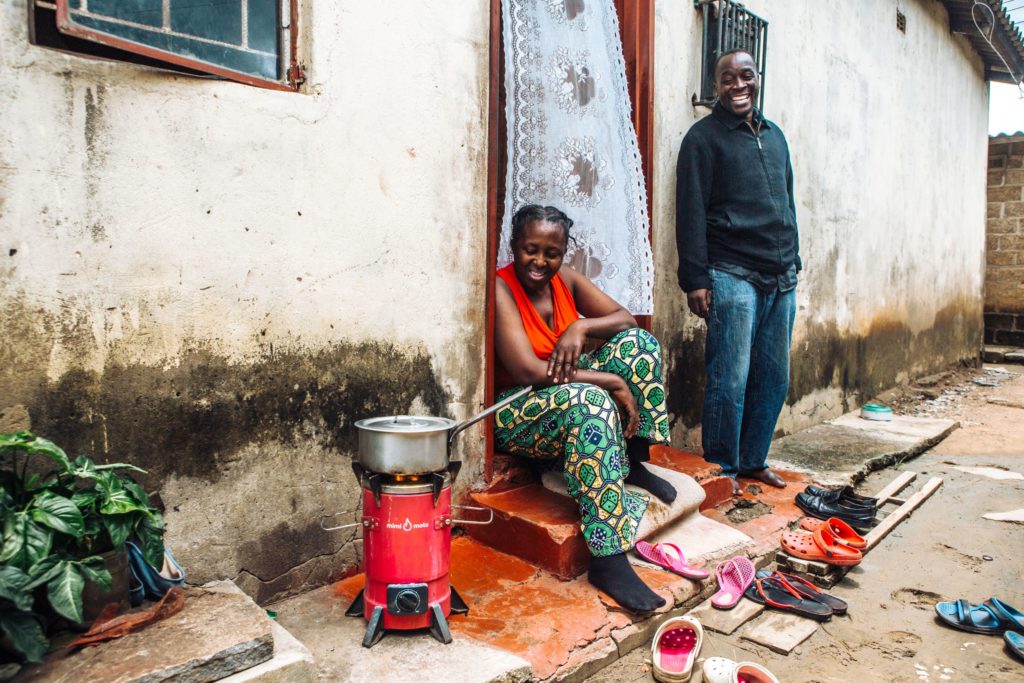Progress on Clean Cooking is Too Slow. That Must Change.

Click here to read the original op-ed via Thomson Reuters Foundation News.
Achieving universal access to clean cooking is one of the most significant levers to achieving global climate and development goals.
Dymphna van der Lans | @DymphnaVDL | Clean Cooking Alliance
Damilola Ogunbiyi | @DamilolaSDG7 | Sustainable Energy for All
Over the past decade, more than 200 million people have gained access to clean cooking solutions. This is a significant achievement, and one that has extended millions of lives, dramatically reduced climate emissions, empowered countless women, and saved billions of dollars in potential economic losses.
But the pace of progress remains far too slow.
Almost 3 billion people – one in three people around the world – lack access to clean stoves and fuels for cooking, instead depending on polluting fuels such as biomass, kerosene, and charcoal for cooking, contributing to significant carbon emissions and leading to the deaths of around 4 million people annually from indoor air pollution.
To achieve global climate and development goals, the world cannot continue to undervalue and underfund one of the world’s most effective, attainable, cross-cutting solutions – achieving universal access to clean cooking.
World leaders have already begun outlining priorities for the decade ahead as part of preparation for dialogues such as the UN General Assembly and the UN Climate Conference (COP26), as well as for the UN High-Level Dialogue on Energy, the first leader-level summit called for on energy by the UN General Assembly in 40 years. Clean cooking – including greater access to electric cooking, clean fuels such as biogas, ethanol, and liquefied petroleum gas, and cleaner, more efficient stoves – must be made a higher priority as part of these and other discussions.
The good news is there is a clear path forward that, with sufficient cooperation, political urgency, and sustained investment, will put us on the fast track toward creating a future where no one’s life is limited by how they cook.
Making these solutions work will require a coordinated approach across the entire clean cooking sector, with a role for every actor – governments, donors, finance institutions, the private sector and civil society. To facilitate this much needed coordination, the Clean Cooking Alliance, together with partners such as Sustainable Energy for All (SEforALL), has developed a Clean Cooking Systems Strategy that aims to unlock a new trajectory for clean cooking The Systems Strategy seeks to catalyze bold ambition and scale concerted action in areas that can drive the most significant impact, such as:
National governments should be empowered and supported to determine their energy pathways that meet the needs of their populations. Governments must set ambitious clean cooking targets that are embedded within their Nationally Determined Contributions (NDCs) and integrated energy plans. These should be implemented through sanctioned delivery units that coordinate clean cooking efforts across government agencies.
Stable policies are vital to develop the clean cooking sector. Governments must enact appropriate taxes that sustain business growth and improve affordability, while putting an end to subsidies for harmful fuels like kerosene. These measures would be a game changer for the clean cooking sector, as they have done in stimulating the off-grid renewable market.
Multilateral development banks and other finance institutions must prioritize clean cooking and provide concessionary capital and blended finance solutions to enable private investment. Results-based financing (RBF) could play a pivotal role, yet we need to find ways to reduce the transaction costs and make the clean cooking ecosystem more credible for RBF purchasers. An RBF Accelerator that streamlines and expands the use of these mechanisms for clean cooking would enable the delivery of solutions at the speed and scale required. The Universal Energy Facility is currently stimulating Africa’s off-grid electricity development in its first wave and could do the same for clean cooking.
We must develop solutions that truly meet the needs of households. The user experience needs to be reflected in all decision making, from shaping policies and national plans, to driving product and business model innovation. This requires generating better insights into user preferences, including through a first-of-its-kind platform being piloted in Rwanda to provide analytics on the usage and impact of different clean cooking solutions, based on data collected from actual households using digital sensors.
These are just a few of the immediate actions that could represent a paradigm shift for clean cooking.
We cannot reach our collective goals without a collaborative effort: it is too important for the planet, and for the billions of people around the world who deserve to be able to safely cook for their families. We call on all actors across the ecosystem to prioritize clean cooking and take bold action to ensure we achieve our climate and development goals, leaving no one behind.
